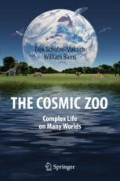Abstract
All life is made up of cells. Unicellular organisms, as the name suggests, have just one cell, although that cell can be enormously complex. Multicellular organisms contain not just many cells, but critically they contain cells that are different from each other. Originating from a single egg, they develop into different cell types that have different functions. It is this specialization that allows multicellular organisms to develop complex structures such as leaves, eyes and brains. Hence the definition of a multicellular organism put forward by G. Bell and A. Mooers in 1997, that multicellular organisms are clones of cells that express different phenotypes despite having the same genotype. The ‘phenotype’ is the physical characteristics of a cell or an organism that the genes program. For example, in humans, liver and brain and muscle cells all have the same set of genes and all derive from one fertilised egg cell, but they are clearly extremely different. This definition captures the most distinctive property of multicellular organisms. Differentiation and eventually specialization within a group of cells with the same genome leads to the increased complexity that we attribute to multicellular organisms. While all the cells of an individual organism have the same genomes, different sets of those genes are active in different cells within the organism. The only clarification which we might want to add to the pointedly short definition by Bell and Mooers is that this achieved differentiation has to be of a cooperative rather than a competitive nature.
Access this chapter
Tax calculation will be finalised at checkout
Purchases are for personal use only
Further Reading
Organisms at the Transition Between Unicellularity and Multicellularity
Dawid, W. (2000). Biology and global distribution of myxobacteria in soils. FEMS Microbiology Reviews, 24, 403–427.
King, N., Westbrook, M. J., Young, S. L., Kuo, A., Abedin, M., et al. (2008). The genome of the choanoflagellate Monosiga brevicollis and the origin of the metazoans. Nature, 451, 783–788.
What Is Multicellularity?
Bell, G., & Mooers, A. O. (1997). Size and complexity among multicellular organisms. Biological Journal of the Linnean Society, 60, 345–363.
Resendes de Sousa Antonio, M., & Schulze-Makuch, D. (2012). Toward a new understanding of multicellularity. Hypotheses in the Life Sciences, 2, 4–14.
Evolution Toward Multicellularity
Irwin, L. N., & Schulze-Makuch, D. (2011). Cosmic biology: How life could evolve on other worlds. Heidelberg: Springer.
Michod, R. E. (2007). Evolution of individuality during the transition from unicellular to multicellular life. Proceedings of the National Academy of Sciences (USA), 104, 8613–8618. doi:10.1073/pnas.0701489104.
Ratcliff, W. C., Denison, R. F., Borrello, M., & Travisario, M. (2011). Experimental evolution of multicellularity. Proceedings of the National Academy of Sciences (USA), 109, 1595–1600. doi:10.1073/pnas.1115323109.
The Need for Oxygen
Bryant, C. (1991). Metazoan life without oxygen. London: Chapman and Hall.
Catling, D. C., Glein, C. R., Zahnle, K. J., & McKay, C. P. (2005). Why O2 is required by complex life on habitable planets and the concept of planetary “oxygenation time”. Astrobiology, 5, 415–438.
Author information
Authors and Affiliations
Rights and permissions
Copyright information
© 2017 Springer International Publishing AG
About this chapter
Cite this chapter
Schulze-Makuch, D., Bains, W. (2017). The First Multicellular Organisms. In: The Cosmic Zoo. Springer, Cham. https://doi.org/10.1007/978-3-319-62045-9_8
Download citation
DOI: https://doi.org/10.1007/978-3-319-62045-9_8
Published:
Publisher Name: Springer, Cham
Print ISBN: 978-3-319-62044-2
Online ISBN: 978-3-319-62045-9
eBook Packages: Physics and AstronomyPhysics and Astronomy (R0)

